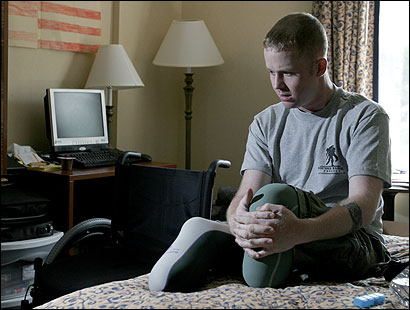Showstopper at the Democratic Debate in Austin? Disability.
 Regardless of whether or not you have a license to participate in political "silly season," Senator Clinton's concluding remarks have been universally lauded as her most memorable, her most genuine of the debate.1 The crowd--and the CNN pundits--gushed over Senator Clinton's self-effacement when compared to wounded U.S. veterans from the war in Iraq.
Regardless of whether or not you have a license to participate in political "silly season," Senator Clinton's concluding remarks have been universally lauded as her most memorable, her most genuine of the debate.1 The crowd--and the CNN pundits--gushed over Senator Clinton's self-effacement when compared to wounded U.S. veterans from the war in Iraq.
Both senators were asked to describe a moment when they were tested and overcame adversity. Obama framed his response in the narrative of his life--born to a teenage mother, abandoned by his father when Obama was two years old, poor choices as a teen. Senator Clinton reflected on the personal trials she has undergone that were public domain because her husband was in the White House when they occurred. However, she minimized her own personal problems by contrasting her situation with soldiers who had undergone amputations as a result of injuries sustained during combat. Senator Obama nodded in agreement as Senator Clinton painted the injuries to these men and women as far worse than her own trials.
However...
By using disability in this rhetorical way, Senator Clinton claims (and Senator Obama does with his agreement) that physical injury, specifically amputation, deserves the greatest respect and, implicit in her remarks, pity. Such a representation undermines PWD's work towards social equality and further ghetto-izes those soldiers (and others with these particular impairments). No doubt, a soldier without a disability faces many obstacles when he or she becomes a person with an impairment, but the benefit of Senator Clinton's commentary is questionable. In fact, representations such as these are regressive, reminiscent of how telethons frame disability and use emotional appeals to touch a presumably normative audience.
As a person with a congenital amputation, I know what I would choose if offered the option of (somehow) having my impairment eliminated or having my spouse commit adultery (let alone having that betrayal made international news). Here's to hoping my box of unused, left-hand gloves continues to accumulate new members.
1As she built up to the final, presumptively-controversial lines, the Vegas oddsmakers must have been going wild trying to settle a line on the likelihood that she would cry. No one watching had any doubt, yet Senator Clinton did disappoint.




Thank you for sending me your blog, I found your perspective, important and interesting. However, your support in Obama is alarming! But that is okay because we will accept your vote when Hillary kicks his ass! I guess we will both be watching Hillary take it to the streets in Ohio, she is bringing switch blades, watch out Obama!
ReplyDeleteFound what Hillary says, Obama has a force field around him in the form of the media, so he will be tough to get to...
ReplyDeleteMy thought: what does a President really do except rally people him/her, schmooze, and energize. May be a bit simplistic, but if correct, then Obama is the person for the job. Hillary will leave the country divided, not by her choice, but I believe it is a fact.
I concur and see Senator Clinton's remarks as exploitive of disability and treated almost as spectacle for the normative gaze of society. In this way, she sets herself apart from those to be "pitied," which in the dialectic places her in a position of respect, honor and authority.
ReplyDeleteSeems to me Senator Clinton falls into the public figure fallback of "support the troops." The reminder and action is certainly important and rooted in a not-so-great historical context, but in modern public speech (it's not only politicians who do it), it feels to me that it's become an insincere rhetorical throw-away. "You can't argue with me if what I'm saying is about 'the troops.'" What's worse is that something that should be empowering (keeping "the troops" top of mind) seems to me to actually serve to marginalize them. All servicemen and -women are viewed as a group we must ourselves "protect", and their individual views and needs are discounted because we somehow already know what they need (our support, etc.). Senator Clinton (and others who use the same rhetorical tools, even head nods) then one-ups this argument by not only supporting the troops, but also extra-special supporting and caring for the disabled troops.
ReplyDelete